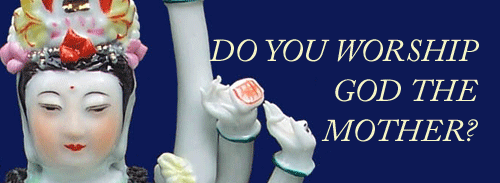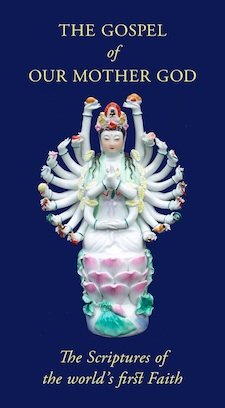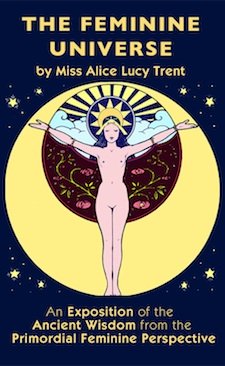Isa Upanishad
Feminine Translation
Provisional Version 1
Text of the Isa Upanishad
All this is whole; and That is whole also. This wholeness has come from That wholeness. And when this wholeness is merged in That wholeness, all that remains is wholeness.
Shantih, shantih, shantih
1. All that turns in this turning world is indwelt by Dea. By renouncing the unreal, guard your True Self. And covet you not the wealth of any maiden.
2. Those who would live long centuries in this world; let them work the works of thamë. For only when the werdes are in thamë may they not cleave to a maiden.
3. The worlds of the demons are wrapped in unseeing darkness; to these worlds, after death, go those maidens that slay the True Self.
4. Unmoving, yet swifter than mind, beyond reach of the senses, the True Self moves before them forever, yet stays ever still. Than the swiftest of all those that run is the True Self yet swifter. In the Wind that is soul of the world, she ordains every work.
5. For She moves and is still, She is far, She is near, She is outside of all, yet within.
6. The wise maid sees all beings in her True Self and her True Self within all beings. How can she then have hate for any?
7. To she who sees, all beings become one within her own True Self. What delusion can can bind, what sorrow can touch, the maid who sees the Oneness of all?
8. For She pervades all. She is radiant, yet bodiless; without muscle, without injury, pure and unsullied by evil. She is the Seer and She is the Thinker; indwelling in all, and Self-existent. She has ordained all in thamë for eternal years.
9. Into great darkness falls she who worships merely nescience. Into greater darkness yet falls she who worships knowledge.
10. Distinct they say is the fruit of knowledge, and distinct the fruit of nescience. So say the learned Elder Mothers to whom the world owes its wisdom.
11. She who knows both knowledge and nescience crosses death through nescience and gains immortality through knowledge.
12. Into great darkness falls she who worships the merely manifest. Into greater darkness yet falls she who worships the manifest.
13. Distinct they say is the fruit of the worship of the manifest, and distinct the fruit of the unmanifest. So say the learned Elder Mothers to whom the world owes its wisdom.
14. She who knows both the manifest and the unmanifest crosses death through the unmanifest and gains immortality through the manifest.
15. The face of Truth is covered with a golden disc. O Radiant Mistress, uncover that we who adore Truth may behold.
16. O Radiant Mistress, sole Traveller of the heavens, O Lady Sun, Daughter of the Golden Womb, withdraw Thy rays and ingather Thy burning effulgence. Now would I see, by Thy Grace, Thy fair Form, the pure Essence of all. For I know that That also am I.
17. Now may my life-breath return to the One Breath and may my body be burned to ashes. AUM. O mind, remember what has been done. Intelligence remember. Remember, O remember.
18. O Annya, great Fire. O Dea, knower of all our deeds; lead us along the good path, whereby we may enjoy in purity the fruits of our action. Destroy our deceitful sins. Reverence, prostration and words of prayer we bring Thee again and again.
A note on this translation of the Isa Upanishad
Many commentators have offered expositions of the profound and beautiful Isa Upanishad. Some highly orthodox and valuable, some rather less so.
We do not propose to do that here. No commentary can exhaust the radiant depth of the Isa Upanishad (which is not to say that a good one cannot be helpful and we may indeed offer one in the future). Rather we recommend that you read and meditate upon it.
What we do wish to do is offer a few notes on this translation. We have discussed the general principles of the Deanic translation of Sanskrit Scripture on our Sanskrit Scripture Page. Here we wish to make a few notes on the particular translation of the Isa Upanishad.
"All that turns in this turning world": All that belongs to the sublunary world of flux and change. Literally, all that belongs to the world of werde which means both fate and worldly activity and literally turning as well as becoming (as opposed to pure Being). See The Wheel of Life for more on the concept of werde.
guard your True Self: The True Self is an important concept in Deanic Moral Thealogy. The concepts of the True and false selves accord with the traditional doctrine that "there are two in us". In everyday use, the True Self is often used to mean simply one's "better self" – the self that belongs wholly to Dea – and since the concept can be applied at many leves, this is perfectly accurate. However, in the fullest sense, the True Self is beyond one's own individual personality. She is the Indwelling Spirit Herself, the Atma (a word that in Sanskrit means both Breath/Spirit and "self" in both the higher and the everyday sense).
When Our Lady says "For the Spirit is One, and I am the Spirit; and you are the Spirit also in the innermost temple of your heart", it is to this one True Self or Spirit that She is referring.
Those who would live long centuries in this world: A more exact translation is "she who would live a hundred years in this world". Clearly Isa Upanishad belongs to the later Iron Age, when the life of maid was reduced to usually less than a century. The ambiguity of our translation is deliberate. It can mean "for those who would live each a long century", or "for those who would live each several centuries". Pure Herthelans live more than a hundred years and we did not wish to tie the text to an exclusively Tellurian meaning. A hundred years, clearly, has also a symbolic significance. The Pure Herthelan equivalent would probably be "three hundred years".
For only when the werdes are in thamë may they not cleave to a maiden: We are dealing here with the doctrine of karma yoga, which is a fundamental theme of Isa Upanishad – the concept of salvation by "work". Work (karma) in this sense seems ambiguous for the West Tellurian mind, because it can mean both everyday activity and ritual action. For traditional people, the distinction between the two things is much less absolute.
In Déanic language, the concepts of werde and thamë are often joined (Sai Werde is said to be the daughter of Sai Thamë). What is being said here is that when werde (in the sense of action, work, worldly activity) is in thamë (meaning ritualised and in harmony with the Golden Order), only then does it not cling to a maid (in the sense of the popular Western usage of "karma", which is legitimate but partial – that is, as an "accretion" that affects us for good or ill from one birth to another) and become what Déanists term "a werde": an accretion.
the Wind that is soul of the world: Sai Vaya, the Wind-Spirit – Who is, of course not truly other than the Spirit in Her other "Forms".
So say the learned Elder Mothers to whom the world owes its wisdom: The learned Elder Mothers are our honoured Ancestresses who transmitted primordial Truth from generation to generation since the beginning. Since the text here is affirming the continuity of Isa Upanishad with the Primordial Tradition, the un-patriarchalised form is clearly more accurate.
Into great darkness falls she who worships merely nescience. Into greater darkness yet falls she who worships knowledge: This and the parallel statement about the manifest and the unmanifest have been subject to various interpretations. What we should understand is that nescience, in Déanic usage, is the precise equivalent to the Sanskrit avidya: non-knowledge, or ignorance in a very special sense. Since the world is ultimately illusion, it is only through nescience that it exists. Pure Knowledge in the highest sense will dispel it.
However, while this seems like a straightforward "anti-worldly" perspective, the force of nescience as a creative power is actually seen positively in many contexts – especially where Dea is being worshipped in Her original feminine form.
Thus in the Angelic Hymn from the Devi Gita we read:
Through Thy power of nescience doth the world appear, like to a rope appearing as a serpent or as a garland of flowers.
Through Thy power of Knowledge Thou dissolvest the world back into thine own Self. Glory unto Thee, O Empress of the Universe.
We must therefore remember – whatever other interpretations may be applied to the Isa Upanishad – that it has to do with the balance between the world-creating nescience and the world-transcending knowledge, just as much of the Isa Upanishad deals with the legitimate fruits of action (werde which is in thamë) as opposed to pure renunciation, in accordance with the words of the Great Hymn to Mahalakshmi from the Padma Purana:
O Dea, Mahalakshmi,
Thou Art the Giver of Intelligence and success
And of both worldly enjoyment and liberation
O Radiant Mistress, sole Traveller of the heavens: Here Dea is addressed in Her Form as Sai Raya, the Janya of the Sun. She is also enjoined to withdraw Her brightness that is "too great for maid to look upon", as described in The Creation. Thus, in Filianic terms, Her Daughter-function is being appealed to.
Thy fair Form, the pure Essence of all: "Essence of all" translates Sanskrit purusha which in Herthelan metaphysical terminology is Essence as opposed to substance (prakriti). See Essence and Substance. In some interpretations "the unmanifest" of verses 12 and 13 is considered to be prakriti or substance (i.e. that which is "below" manifestation – sub-stance is literally that which "stands below"). Essence is also unmanifest, but is that which stands "above" manifestation and may also be seen as the Divine Creative Intelligence creates the forms of all things which are embedded in, but do not ultimately belong to, "matter".
However, there are other interpretations of "the manifest" and "the unmanifest" – such as the Personal and Impersonal, or Formal and Supra-Formal, aspects of Dea. In Filianic Faith these are represented by the Mother and the Dark Mother (see the Filianic Creed).
O Annya, great Fire: Sai Annya, the Janya of Fire. As is usual in Isa Upanishad, the Janyati are seen from the highest perspective, as aspects of Dea Herself.
Read your Bible: The Gospel of Our Mother God
Please support the Chapel of Our Mother God
Send Questions or Comments on Isa Upanishad
Chapel of Our Mother God Homepage
All written material at the Chapel of Our Mother God is copyright. Should you wish to reproduce any portion please contact us for permission.
YouTube or Facebook
This section:
Fundamental Beliefs
A complete guide to the faith of God the Mother
FILIANIC SCRIPTURES
Gospel of Our Mother God
The Gospel of Our Mother God is a collection of inspirational texts, prayers and daily inspiration for the Mother-Faith devotee or household.
The Feminine Universe
The Other Philosophy
Everything you have ever heard comes out of the patriarchal world-view. Its materialism, its religion, even its feminism. Here is the other way of seeing the world; the natural way: the way that everyone saw things before patriarchy and will again when patriarchy is long forgotten.


